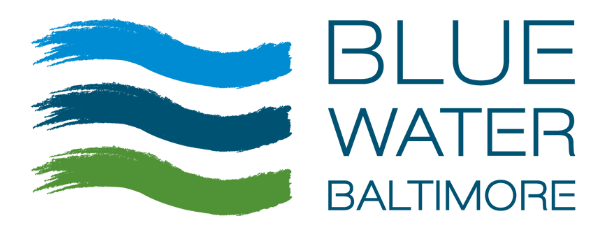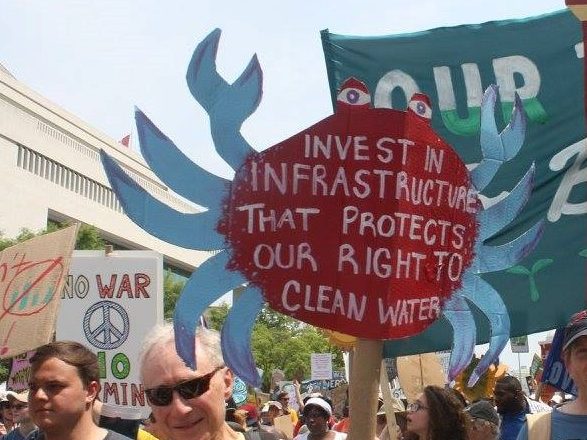Updates On Maryland’s Legislative Session
Summary
Blue Water Baltimore is providing input on dozens of bills during MD's legislative session that will impact environmental and community health in the watersheds where we work. Below is some information about a few key proposals. Check out the ‘Maryland Policy’ section of our Advocacy page to see the full list of bills that we’re tracking this legislative session.
Maryland’s 2023 Legislative Session started on January 11th and will continue until April 10th. During these 90 days, legislators are considering thousands of bills.
Blue Water Baltimore is providing input on dozens of bills this session that will impact environmental and community health in the watersheds where we work. Below is some information about a few key proposals. Check out the ‘Maryland Policy’ section of our Advocacy page to see the full list of bills that we’re tracking this legislative session.
Baltimore Regional Water Governance Task Force (HB0843 / SB0880)
What will this bill do?
This bill will establish a Task Force to study and recommend a regional governance model for Baltimore’s water system.
Why is this important?
Baltimore City currently provides water and wastewater services to close to 2 million people across the city, Baltimore County, and parts of Anne Arundel, Carroll, Howard, and Harford Counties. The inter-jurisdictional agreements that govern this arrangement have not been updated since the 1970s. A few years ago, Baltimore City and County commissioned a business review of the region’s water and sewer services to develop recommendations for a “utility of the future” with increased coordination. This bill seeks to codify the third recommendation from that 2021 report, which called for stakeholders to collaboratively assess and propose alternatives to the water system’s current governance system.
While there can be benefits to consolidating the management of water systems, there are also serious impacts that must be considered and mitigated based on experiences in other jurisdictions. A key point of comparison for Baltimore is Detroit, whose water system was regionalized in 2013, much to the detriment of Detroit’s Black residents. Since Baltimore City and County have similar racial and class differences as Detroit does with its surrounding counties, it is vital that legislators look seriously at what happened in Detroit and center an equity lens when considering this legislation and any subsequent discussions of regionalizing Baltimore’s water system.
How can this bill be improved?
We want this Task Force to be built for success – for the environment, and for ratepayers in Baltimore City as well as surrounding counties. Due to the inequitable outcomes of regionalization in other parts of the country, we support the Baltimore Right to Water Coalition’s proposed amendments to this bill. Those amendments call for a broader range of stakeholders to be represented on and consulted by the Task Force, meaningful opportunities for public input and engagement, racial and economic equity impact assessments, continuation of existing local ratepayer and labor protections, and a longer timeline for this complex work to be conducted.
Maryland Native Plants Program (HB0950 / SB0836)
What will this bill do?
This bill will increase the sale and purchase of native plants in Maryland by establishing a Maryland Native Plants program through the Maryland Department of Agriculture (MDA) and the University of Maryland Extension (UME). It will create a voluntary labeling program and logo, develop an online list of Maryland native plants, and create a Maryland grower/retailer certification program to help Marylanders buy and retailers sell native plants.
Why is this important?
This bill will support the growth of native plants in Maryland, which offer a multitude of benefits to our waterways and our local ecosystems. Native plants help reduce stormwater pollution entering the Chesapeake Bay by reducing nutrient runoff and requiring less chemical inputs than non-native plants. They have deeper root systems than non-natives and are better at stabilizing soils and preventing sediment runoff. They also provide critical habitat and food for butterflies, birds, and pollinators. That’s why Blue Water Baltimore operates the Herring Run Nursery!
Environment – Suppliers of Water – Notification Requirements (HB0624)
What will this bill do?
This bill will require water suppliers to provide public notification about drinking water contamination via at least three different mediums and expands the methods for notification to include text messages and robocalls.
Why is this important?
The E. coli drinking water crisis in West Baltimore in September 2022 was exacerbated by untimely and confusing communication from public officials. Baltimore City’s Department of Public Works (DPW) initially relied primarily on social media to communicate about the contamination and did not issue a detailed press release until late in the day on Monday, September 5th (the first test came back positive on Saturday, September 3rd).
How can this bill be improved?
While it is important that this bill will expand the number and types of methods public officials communicate with the public about water contamination, it does not address a key issue exposed by the September 2022 E. coli crisis: the timeliness of a boil water advisory. Currently, water suppliers are not required to notify the public about E. coli or other contaminants in their drinking water until a second test verifies the positive result. We believe that residents have the right to know about ANY positive test for bacteria or other contaminants in their drinking water as soon as they are discovered. That is why we recommended this bill include an amendment requiring the issuance of a precautionary boil water advisory within 2 hours of the first positive E. coli detection.
Wastewater Facility Supplemental Operations and Maintenance Grant Program – Establishment (SB0392)
What will this bill do?
This bill will direct new funding specifically to wastewater treatment plants that serve low-income communities, including the Patapsco and Back River WWTPs in Baltimore.
Why is this important?
The Patapsco and Back River WWTPs are equipped with some of the most cutting-edge technologies available, giving the plants the ability to produce effluent that meets and even exceeds the standards for Enhanced Nutrient Removal systems. However, there is a gap in available state and federal funding needed to adequately staff these plants with qualified operators and to perform the maintenance needed to keep them running properly. Instead, these costs fall directly upon the water system’s ratepayers, many of whom are already financially overburdened. This bill would help address the inequitable financial burden put on Baltimore ratepayers, and ultimately, more resources flowing into these facilities will mean cleaner waterways and healthier communities in Baltimore City, Baltimore County, and Anne Arundel County.
Take Action!
- Sign these petitions to your state legislators:
- Sign up for advocacy alerts to stay informed and take action. We’ll keep you updated on local and state bills and how you can participate in the legislative processes in Baltimore and Annapolis.

